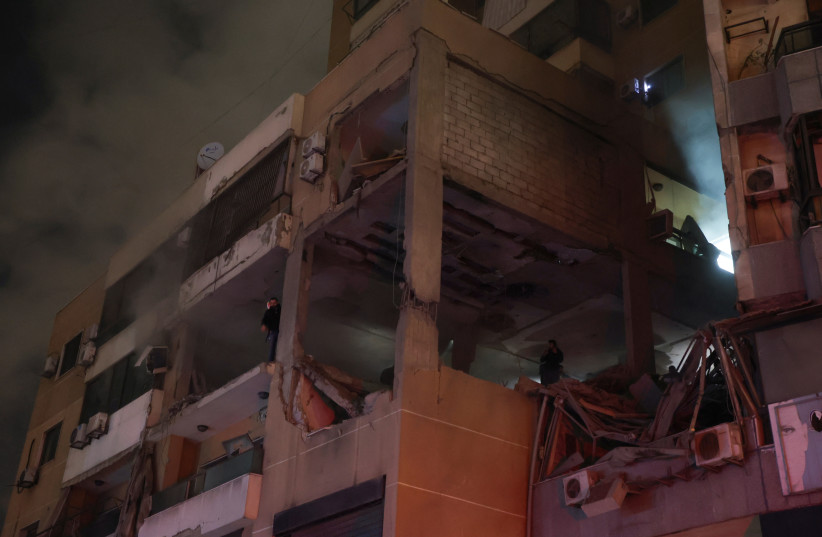The killing of Hamas deputy leader Saleh al-Arouri in Beirut is a game changing event and represents the end of an era for his Hamas organization.
For decades Hamas has enjoyed growing impunity for its crimes.
For instance, its leaders became increasingly active abroad, moving between Doha, Beirut and Ankara. After October 7, Hamas was also successful in getting many countries not to condemn their crimes against humanity. For instance, Russia, China, Turkey and other key countries did not condemn the Hamas attack.
Hamas has also enjoyed impunity from international organizations. It was able to built up a terror tunnel empire in Gaza in part because it got funding from abroad and because a plethora of organizations were willing to deal with health care and essential services.
The Palestinian Authority even paid salaries in Gaza, despite the fact that Hamas had forced it out of the Strip in 2007. The entire situation was strange. Hamas, a terrorist group, ran Gaza as if it was a government. Its leadership was hosted in Doha, the capital of Qatar, which is a major non-NATO ally of the US. By hosting Hamas, Doha actually got increased status as a Western ally. Turkey, a member of NATO, has also hosted Hamas leaders over the years for meetings.
But now Arouri is gone. Hamas leader Ismail Haniyeh has said that Hamas “will never be defeated," after the assassination of its deputy leader in Lebanon by Israel. "A movement whose leaders and founders fall as martyrs for the dignity of our people and our nation will never be defeated," Haniyeh said on Tuesday evening.

Hamas also lost others in Beirut on Tuesday. Samir Findi Abu Amer and Azzam Al-Aqraa Abu Ammar, were also eliminated in the same blast in Dahiyeh that killed Arouri.
Hezbollah is non-plussed. The fact that incident happened in an area it controls and where it feels secure raises eyebrows for the Lebanese-based terrorist group. Hezbollah has said the “assassination” will not go “unanswered.”
Hezbollah views the killing as an assault on Lebanon
“We, Hezbollah, affirm that this crime will not go unanswered or unpunished," it said. "We consider the crime of assassinating Sheikh Saleh al-Arouri... in the heart of the southern suburb of Beirut to be a serious assault on Lebanon... and a dangerous development in the course of the war.” Ankara has warned in the past against the killing of any Hamas members in Turkey.
It's worth remembering a few details about Arouri. Born in the village of ‘Arura near Ramallah in 1966, he became involved in terrorist activity and was sentenced to five years in prison in 1992. This was during the Oslo era when Hamas was trying to sabotage the peace deal with Israel.
Arouri was released from prison in 2010 and moved to Jordan, then on to Syria and then to Turkey, according to the Meir Amit Intelligence Information Center. He then moved to Qatar briefly and then to Beirut, where he basically moved in with Hezbollah and began plotting crimes from Lebanon.
In 2015, he was designated a terrorist by the US, which put a $5 million reward out for him. Arouri played a role in the Shalit deal in 2011 in which more than 1,000 terrorists, including Yahya Sinwar, were released for the Israeli soldier Gilad Shalit. He was elected deputy head of Hamas in 2017, Al-Mayadeen media notes.
Arouri has been involved in supporting and planning terrorist attacks in the past. He was linked to the kidnapping and murder of three Israeli teens in 2014. He warned in September 2023 that a war was coming to the Middle East, and blamed Israel for such a scenario. That month he also took part in meetings in Lebanon with Palestinian Islamic Jihad, Iranian officials and Hezbollah, and then called for escalating attacks on Israel.
He is sometimes described as an “architect” of the October 7 attack. He praised the massacre and claimed it was a response “to the crimes of the occupation."
The end of an era
Now it appears the Arouri era may be ending. He was a living embodiment of Hamas terrorist privilege. His ability to move around the region with ease was an example of how the genocidal terrorist group operated openly. Hamas exploited the region. With Iran’s backing and cash support, it was able to manipulate the region and also build up its massive terrorist infrastructure in Gaza.
Arouri was a key part of that machine. He was also able to network in Turkey, and most recently in Beirut to increase threats to Israel. Many media outlets in the region are now reflecting on the life of Arouri. Al-Ain media in the Gulf and Arab News both have put up articles discussing his life and his operations over the years.
The Arouri era is also marked by a period in which Hamas built up its capacity in Gaza. It came to rule the coastal enclave in 2007 and its leaders now relax abroad while they have helped Hamas in the Strip leverage its rule to become a regional terrorist threat. The October 7 attacks illustrated this. Although Hamas was much less influential in the 1990s, it was able to galvanize support even then.
For instance, Khaled Mashal was able to travel to Jordan during those years. Hamas leaders who were briefly exiled to Lebanon in the '90s by Israel received international support. However, the group was more isolated in the early 2000s during the Intifada.
Arouri’s role in the region was key to the group's expansion over the last decade, even though it was contained in Gaza. Hamas expanded in the region, and it got more legitimacy, which it has exploited after October 7. Arouri was a symbol of this attempt by Hamas to grow its influence, networking from Qatar to Turkey to Lebanon.
